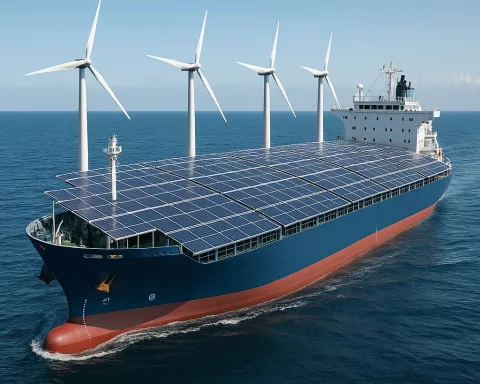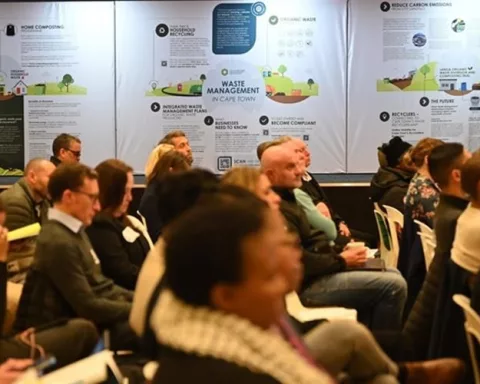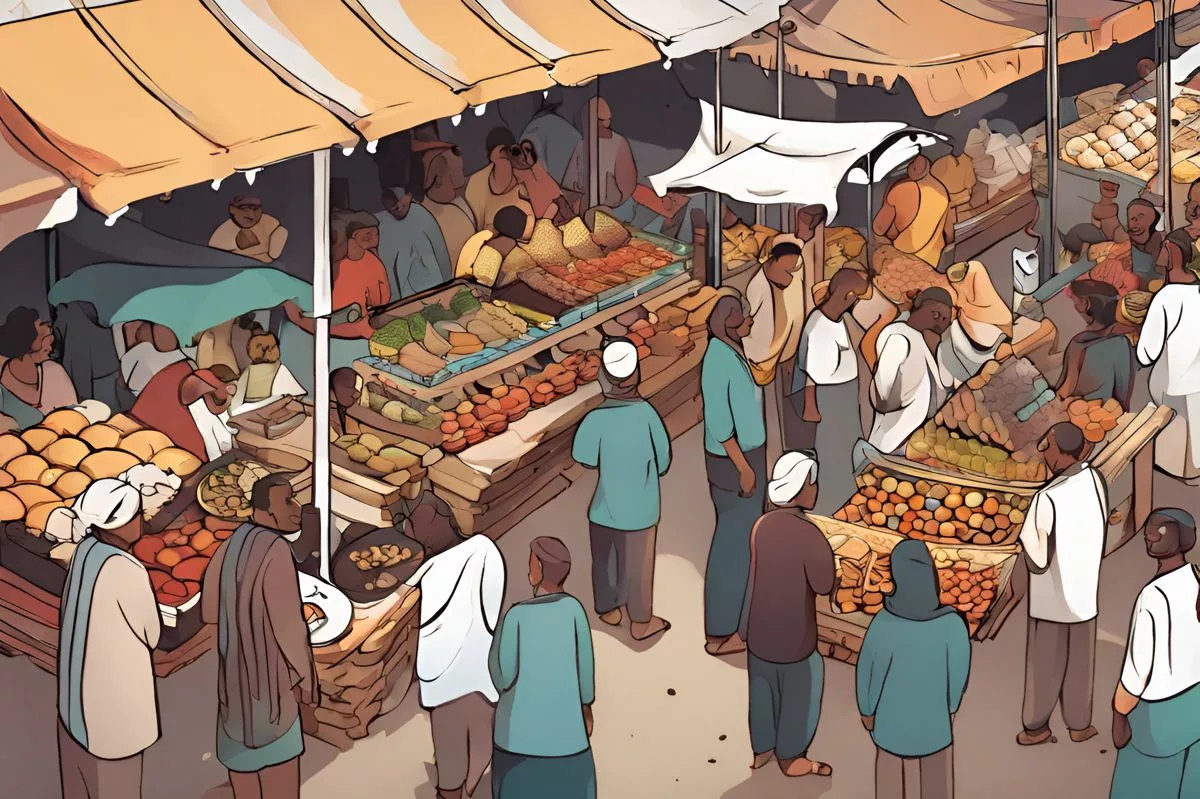The African Circular Economy Alliance (ACEA) is leading the way in promoting a shift towards a circular economy in Africa, which challenges the traditional ‘take, make, dispose’ approach and focuses on principles of recycle and regenerate. The potential impact of this shift includes job growth, strengthened economies, and environmental benefits. At a recent Ministerial Briefing Dinner in Abidjan, Dr. Dion George, Minister of Forestry, Fisheries & Environment of South Africa, emphasized the urgent need for change towards a circular economy to address environmental challenges and socio-economic issues facing the continent.
What is the circular economy, and why is it important for Africa’s sustainable future?
The circular economy is an innovative concept that challenges the traditional ‘take, make, dispose’ approach, focusing on recycle and regenerate principles. Africa, with its wealth of natural resources and rapidly growing population, is uniquely positioned to spearhead the shift towards a circular economy. The African Circular Economy Alliance (ACEA) has been promoting this vision since 2016, with the potential impact including job growth, strengthened economies, and environmental benefits.
As dusk fell in Abidjan, Côte d’Ivoire, a wave of anticipation and optimism filled the room. The African Circular Economy Alliance (ACEA) was about to stage a Ministerial Briefing Dinner, marking a historic event that would shine a spotlight on one of the most pressing global challenges we face: sustainability. Among the distinguished guests was a person whose commitment to the cause was beyond dispute – H.E. Dr Dion George, Minister of Forestry, Fisheries & Environment of South Africa.
The Call for Transformation
Dr. George, a highly respected figure in the African environmental dialogue, opened the ceremony with a keynote speech that was a resounding call for change. His powerful words echoed with the urgency of the message, emphasizing the essential need to shift the paradigm towards a circular economy. This innovative concept revolves around the ‘recycle and regenerate’ principle, fundamentally challenging the way we produce, consume and discard resources. The circular economy model deviates from the archaic linear ‘take, make, dispose’ approach, providing a viable alternative that maximizes resource utilization while drastically reducing waste.
Dr. George outlined the unique positioning of the African continent to spearhead this global change. With its wealth of natural resources, entrepreneurial mindset, and rapidly growing population, Africa has the ability to convert its challenges into potential opportunities. Nevertheless, the transition towards a circular economy is not just an environmental obligation, but also a socio-economic necessity. The urgency for action is reinforced by the loss of over 2 million hectares of forest cover annually, threats of desertification and drought affecting livelihoods, and inadequate waste management accelerating the climate crisis.
The Role and Potential of the ACEA
Since its establishment in 2016, the ACEA has played a crucial role in promoting the vision of a circular economy across the continent. Through the creation of knowledge platforms, conducting research on critical issues such as plastics, electronic waste, and construction waste, the ACEA has built a strong foundation for a sustainable future. Importantly, the circular economy, as emphasized by Dr. George, holds the potential to stimulate job growth, strengthen economies, and encourage innovation.
The estimated impact is considerable. Adopting circular principles could result in an additional 11 million jobs by 2030. Given that more than 10 million young Africans join the workforce every year, capitalizing on these prospects cannot be ignored. The ACEA’s achievements were applauded during the discussions, but the question of the next steps remained unanswered.
Questions and Ambitions for the Future
Showcasing a forward-thinking perspective, Dr. George posed several intriguing questions. He wondered about the potential for the ACEA to broaden its impact and how circularity could become a core component of national and regional development strategies. He questioned how political will, financial resources, and technological innovation could be mobilized to speed up Africa’s transformation towards a circular economy. His questions were met with silence, but the underlying message was clear – “We have the capacity to achieve more.”
Circular Solutions for Agriculture and Plastic Pollution
Dr. George elaborated on the potential of the circular economy to address drought resilience, land degradation, and desertification, all pressing topics of the AMCEN 10th Special Session. He suggested that circular agriculture could provide solutions to regenerate degraded soils and alleviate water stress. The utilization of organic waste as a resource could boost soil fertility, improve crop yields, and regenerate ecosystems.
The problem of plastic pollution, which continues to ravage our lands and rivers, was another key point in his speech. He urged the ACEA to take a more pro-active role in tackling this issue. The United Nations Environment Programme (UNEP) has revealed that agricultural soils may receive more microplastics than oceans, impacting both soil and food quality. Therefore, the circular economy could play a crucial role in addressing this crisis.
The Significance of Land and Call to Action
As the event unfolded, Dr. George emphasized the importance of land. He suggested that Africa’s rich biodiversity and expansive landscapes are both its greatest assets and responsibilities. The Abidjan Legacy Programme, launched at the UNCCD COP15 in May 2022, provides a path towards achieving Land Degradation Neutrality by 2030. By integrating the principles of circular economy, we can restore degraded lands, build resilient communities and secure food sufficiency.
In his concluding remarks, Dr. George issued a Call to Action. He passionately advocated for expanding the ACEA, incorporating circular economy approaches into national policies, promoting innovation and technology, building regional and global partnerships, enhancing regular engagements, advocating education and training, and implementing monitoring and evaluation mechanisms.
As he concluded, he reminded the audience that Africa stands at a critical juncture. The opportunity to reshape its economic model is present, promising not just environmental benefits, but also the future prosperity of its people. As the Minister of Forestry, Fisheries & Environment of South Africa, his dedication to this cause was evident. It was a vision of a sustainable Africa, a vision that he eagerly anticipates bringing to fruition through the collective efforts of all those present.
1. What is the circular economy and why is it important for Africa’s sustainable future?
The circular economy is a concept that challenges the traditional linear approach of ‘take, make, dispose’ and instead focuses on principles of recycle and regenerate. It is important for Africa’s sustainable future because it maximizes resource utilization, reduces waste, and has the potential to stimulate job growth and strengthen economies.
2. What is the African Circular Economy Alliance (ACEA) and what role does it play in promoting a circular economy in Africa?
The ACEA is an organization that promotes the vision of a circular economy in Africa. It creates knowledge platforms, conducts research, and builds a strong foundation for a sustainable future. The ACEA aims to broaden its impact and make circularity a core component of national and regional development strategies.
3. What are the potential impacts of adopting circular principles in Africa?
Adopting circular principles in Africa could result in an additional 11 million jobs by 2030. This is important since more than 10 million young Africans join the workforce every year. Circular principles could also stimulate innovation, strengthen economies, and encourage sustainable development.
4. How can the circular economy address plastic pollution and agriculture in Africa?
The circular economy can address plastic pollution by encouraging the reuse and recycling of plastic waste. It can also address agriculture by promoting circular agriculture, which regenerates degraded soils, improves crop yields, and restores ecosystems.
5. What is the Abidjan Legacy Programme, and how can the circular economy contribute to achieving Land Degradation Neutrality?
The Abidjan Legacy Programme is a path towards achieving Land Degradation Neutrality by 2030. The circular economy can contribute to this goal by restoring degraded lands, building resilient communities, and securing food sufficiency.
6. What is the Call to Action issued by Dr. Dion George, Minister of Forestry, Fisheries & Environment of South Africa?
Dr. George issued a Call to Action, advocating for expanding the ACEA, incorporating circular economy approaches into national policies, promoting innovation and technology, building regional and global partnerships, advocating education and training, and implementing monitoring and evaluation mechanisms. He emphasized the importance of reshaping Africa’s economic model for a sustainable future.












